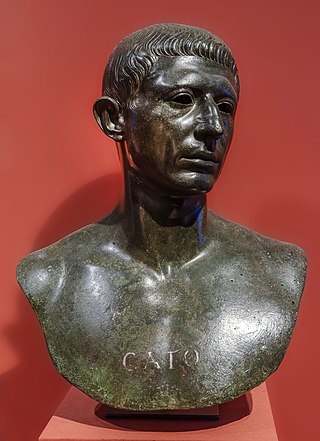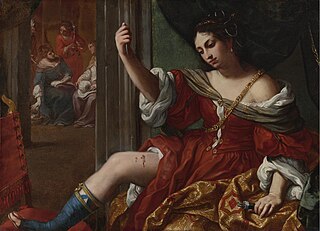Family tree
| |||
| Notes: |
Atilia (sometimes spelt Attilia) was the first wife of Marcus Porcius Cato Uticensis and mother of his two eldest children.
It is not known for certain who Atilia's father was, but he was from the Atilii Serrani. He may have been Gaius Atilius Serranus the consul of 106 BC, [1] or Gaius' son. [2]
Cato married Atilia c. 73 BC, after his intended wife, Aemilia Lepida married Quintus Caecilius Metellus Pius Scipio Nasica. [3]
In the words of Plutarch: [4]
Cato and Atilia had a son Marcus Porcius Cato, who later died in the second Battle of Philippi, and a daughter Porcia, who became the wife of her cousin Marcus Junius Brutus.
Circa 63 BC, Cato divorced Atilia on the grounds of her unseemly behaviour, later marrying Marcia. [5] Atilia is not mentioned again.
| |||
| Notes: |

Marcus Porcius Cato, also known as Cato the Censor, the Elder and the Wise, was a Roman soldier, senator, and historian known for his conservatism and opposition to Hellenization. He was the first to write history in Latin with his Origines, a now fragmentary work on the history of Rome. His work De agri cultura, a rambling work on agriculture, farming, rituals, and recipes, is the oldest extant prose written in the Latin language. His epithet "Elder" distinguishes him from his great-grandson Cato the Younger, who opposed Julius Caesar.

Lucius Cornelius Scipio Asiaticus was a general and statesman of the Roman Republic. He was the son of Publius Cornelius Scipio and the younger brother of Scipio Africanus. He was elected consul in 190 BC, and later that year led the Roman forces to victory at the Battle of Magnesia.
Lucius Aemilius Paullus Macedonicus was a two-time consul of the Roman Republic and general, who conquered Macedon in the Third Macedonian War.
Servilia was a Roman matron from a distinguished family, the Servilii Caepiones. She was the daughter of Quintus Servilius Caepio and Livia, thus the half-sister of Cato the Younger. She married Marcus Junius Brutus, with whom she had a son, the Brutus who, along with others in the Senate, would assassinate Julius Caesar. After her first husband's death in 77, she married Decimus Junius Silanus, and with him had a son and three daughters.

Marcus Porcius CatoUticensis, also known as Cato the Younger, was an influential conservative Roman senator during the late Republic. His conservative principles were focused on the preservation of what he saw as old Roman values in decline. A noted orator and a follower of Stoicism, his scrupulous honesty and professed respect for tradition gave him a powerful political following which he mobilised against powerful generals of his day, including Julius Caesar and Pompey.

Porcia, occasionally spelled Portia, especially in 18th-century English literature, was a Roman woman who lived in the 1st century BC. She was the daughter of Marcus Porcius Cato Uticensis and his first wife Atilia. She is best known for being the second wife of Marcus Junius Brutus, the most famous of Julius Caesar's assassins, and appears primarily in the letters of Cicero.
Aemilia Lepida is a Latin feminine given name that was given to the daughters of various Aemilius Lepiduses, men belonging to the Lepidus branch of the Aemilia gens (family) that was founded by the Marcus Aemilius Lepidus who served as consul in 285 BC. The Aemila Lepidas who appear in Roman historians were principally known for their engagements and marriages, with those in the late Republic and early Empire related to the Julio-Claudian dynasty.

Gaius Porcius Cato was a Roman politician and general, notably consul in 114 BC. He was the son of Marcus Porcius Cato Licinianus and grandson of Cato the Censor.
Marcus Porcius M. f. M. n. Cato Salonianus was the younger son of Cato the Elder, and grandfather of Marcus Porcius Cato Uticensis, also known as "Cato the Younger".
Quintus Servilius Caepio was a Roman patrician, statesman and soldier. He was the son of Quintus Servilius Caepio who was consul in 106 BCE and who lost his army during the Battle of Arausio. He was elected praetor some time in the last 90s BC and fought for Rome during the Social War. He was killed in the second year of the war while fighting the Marsi by Quintus Poppaedius Silo.
Marcus Porcius Cato, son of Cato the Younger by his first marriage to Atilia, was a Roman soldier and in his earlier years spent some time in politics with his father. Although he never achieved greatness, he was admired by close friends and relatives, and also served his father most loyally and shared his ideals. Marcus was renowned for being a man of gallantry and warm temperament.

Marcia was the second wife of Marcus Porcius Cato Uticensis and the daughter of Lucius Marcius Philippus.
Servilia, also known as Servilia Minor or Servilia the Younger was the second wife of Lucullus.
Salonia was a Roman slave, and later freedwoman who lived during the mid-2nd century BC, and who was the second wife of Cato the Elder. She was the young daughter of the slave Salonius who was an under-secretary to Cato the Elder. Following the death of his first wife, Cato began taking solace with a slave girl who secretly visited his bed.
Licinia is the name used by ancient Roman women of the gens Licinia.
Gaius Laelius Sapiens, was a Roman statesman, best known for his friendship with the Roman general and statesman Scipio Aemilianus. He was consul of 140 BC, elected with the help of his friend, by then censor, after failing to be elected in 141 BC. Gaius Laelius Sapiens was the son and heir of the Punic War general Gaius Laelius, himself consul in 190 BC. This Laelius had been former second-in-command and long-time friend, since childhood, of the Roman general and statesman Scipio Africanus. The younger Laelius was apparently born around 188 BC, after his father had become consul but had failed to win command of the campaign against Antiochus III the Great of Syria, which would have made him a rich man. His mother's name is unknown.

The gens Porcia, rarely written Portia, was a plebeian family at Ancient Rome. Its members first appear in history during the third century BC. The first of the gens to achieve the consulship was Marcus Porcius Cato in 195 BC, and from then until imperial times, the Porcii regularly occupied the highest offices of the Roman state.
The gens Laelia was a plebeian family at Rome. The first of the gens to obtain the consulship was Gaius Laelius in 190 BC.
Marcus Porcius M. f. M. n. Cato was the father of Cato the Younger. His promising political career was cut short by his sudden death, early in the first century BC.
Livia Drusa was a Roman matron. She was the daughter of Marcus Livius Drusus, consul in 112 BC, and sister of Marcus Livius Drusus, tribune of the plebs in 91 BC. She was the mother of Cato the Younger, and grandmother of Marcus Junius Brutus, through her oldest daughter Servilia.